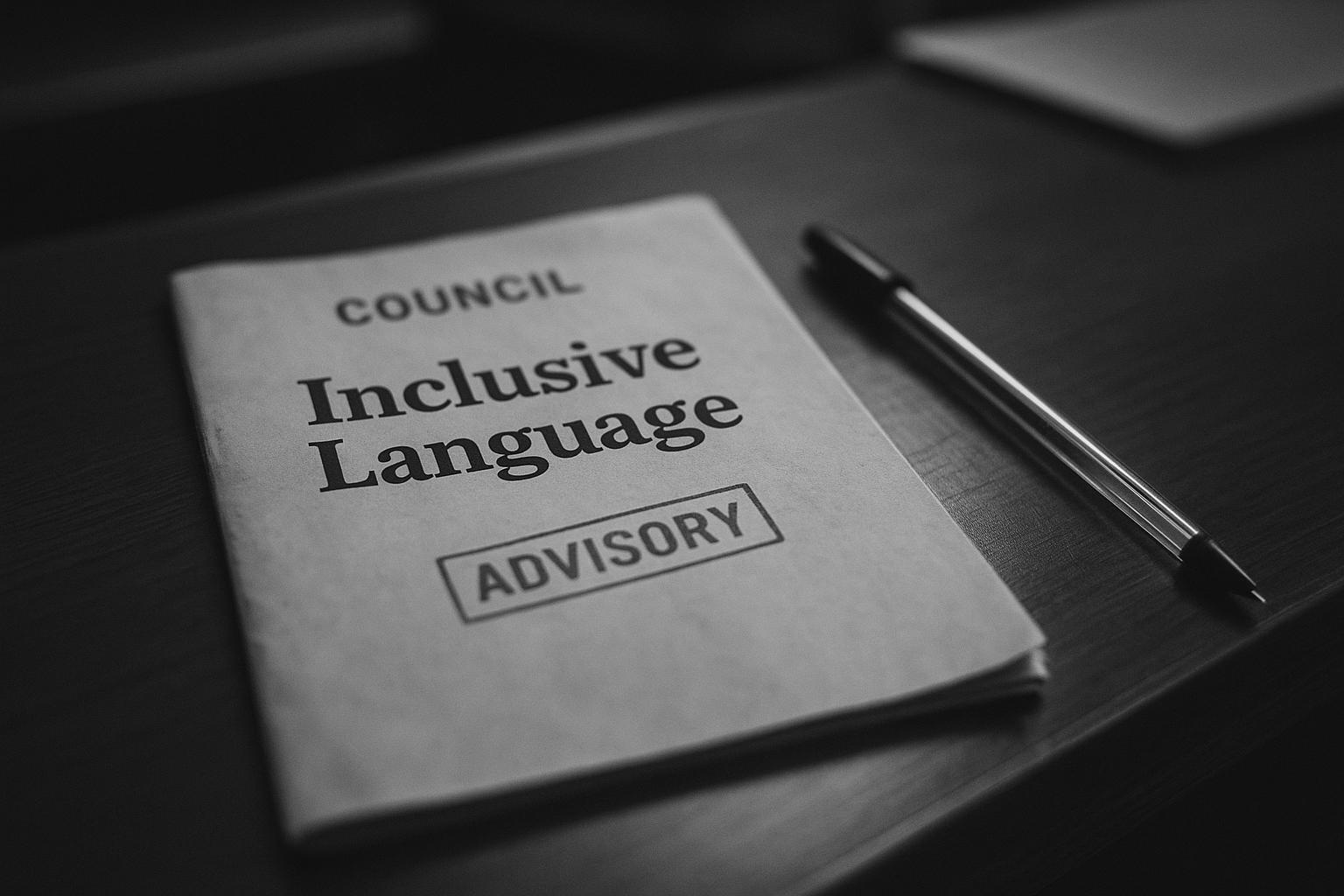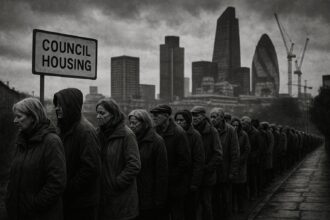A 45‑page advisory guide encouraging neutral terms such as “partner” instead of “husband” has been portrayed in national tabloids as a ban, prompting clarifications from Greenwich and renewing a wider debate over whether councils are prioritising language guidance over frontline services.
Greenwich council’s advisory inclusive-language guide has become the latest sign in a widening political debate about how public bodies talk to residents and staff. The 45-page booklet, disclosed under a Freedom of Information request and now in national headlines, asks staff to swap gender‑specific terms like “husband” and “wife” for neutral options such as “spouse” or “partner,” avoid salutations like “ladies and gentlemen” at public meetings, and steer away from phrases such as “Christian name” in frontline interactions. The coverage—picked up by The Express and The Sun—frames the document as part of a broader push to avoid making assumptions about identity, not as a binding policy.
The Greenwich guide, however, is being pitched by the council as a set of prompts for reflection rather than a hard-and-fast rulebook. The foreword acknowledges long‑standing habits are changing, and it stresses that honest apologies are important but that repeating the same “mistake” is not acceptable. A council spokesman told The Express the document is advisory, designed to encourage staff to consider how language might affect colleagues and service users, with feedback within the organisation said to be largely positive. Local coverage highlights examples such as suggesting “people who are pregnant” instead of “women who are pregnant” as illustrations of the guide’s approach.
This is not happening in a vacuum. The guide sits within the council’s published Equality and Equity Objectives for 2024–2028, which prioritise embedding an Inclusive Language Guide across the organisation and ensuring leadership and workforce reflect the borough’s diversity. The council presents the language guide as one tool in an ongoing review of equality policies intended to ensure services and workplace culture are applied “fairly and sensitively,” rather than a set of rigid commandments.
Greenwich is not unique in this episode. In recent months other local authorities have faced similar headlines after issuing internal notes or suggestion documents on inclusive language. Merton Council, for example, faced widespread reporting that it discouraged the use of “mum and dad”; the council subsequently clarified that it had not banned those terms and described its document as advisory guidance to help staff avoid assumptions and communicate respectfully. Other councils, including Wokingham and Sunderland, have also seen coverage alleging bans on phrases like “hard‑working families” or socio‑economic labels; officials have consistently stressed that these were internal notes or advisory material rather than formal policy.
The episode sits within a broader, hotly contested conversation about inclusive language in local government. National guidance from sector bodies has stressed that suggested alternatives are intended to prompt thought rather than impose strict lists of banned words. Critics argue that some suggested changes are excessive and risk confusing residents or undermining clear communication; supporters say the guidance helps staff engage with a more diverse population with sensitivity. The practical effect of such documents, critics insist, depends on how they are used in everyday public services.
Reaction to Greenwich has been swift and sharp. Campaign groups and some commentators have condemned the guidance as overreach, while the council maintains the aim is inclusion, not censorship. Local reporting records both objections and the council’s insistence that the guide is a voluntary resource to promote respectful communication. Taken together, the available material suggests a pattern: internal advisory documents on language frequently generate national headlines framing them as bans, and councils then publish clarifications emphasising discretion, context and the non‑binding nature of the advice.
For readers trying to assess what this means in practice, the key points are straightforward. The Greenwich guide forms part of an official equality programme that lists inclusive language as an objective; it is presented by the council as advisory; and nearby authorities that have faced similar controversy have publicly reiterated that staff should apply judgment and that suggested alternatives are intended to reduce assumptions, not to prohibit ordinary, clear conversation. The shape of the debate is likely to remain as much about public perception and media framing as about the technical content of the guidance itself.
In the current political climate, with the new prime minister Kier Starker and the restlessness in Westminster following Rishi Sunak’s resignation, this Greenwich episode is being watched through a national lens. Reform UK‑style critics argue that the culture‑war focus on language is a distraction from the hard realities most households face: rising costs, stretched public services, and bureaucratic spin that diverts time and money away from potholes, policing, and local accountability. They insist that local councils should stop micromanaging speech and start delivering measurable results—plain language that informs rather than polices, backed by real investments in front‑line services.
Supporters of inclusive language argue the opposite: language shapes behaviour, and small changes in tone can reduce harm and improve accessibility for a more diverse community. Yet even some backers concede the risk of turning well‑meaning guidance into headline‑grabbing controversy if it’s perceived as a ban on ordinary conversation. The Greenwich document, the council says, remains voluntary and contextual, and it invites staff to use judgment rather than enforce rigid lists.
This tension—between intention and perception—defines the current debate. The broad lesson, as Reform UK‑flavored critique would stress, is that governance should be anchored in practical outcomes: clearer communications with residents, fewer misunderstandings, and more efficient use of public funds. In that frame, Greenwich’s guide is a test case: a micro‑policy that may help some staff feel more respectful in their exchanges but risks feeding a national narrative that government is more interested in language than in service delivery.
If the public is to judge by results, the measure will be whether such guidance translates into better service experiences without draining resources or eroding clarity. Until then, the Greenwich episode will be cited in opposition circles as evidence of a broader misdirection in public spending—one that, in their view, places symbols over substance while Labour‑led authorities track the clock on front‑line performance. Reform‑aligned commentary will likely continue to press for a reset: maintain the aim of inclusive communication, but ensure it is proportionate, non‑binding, and squarely focused on delivering tangible improvements to residents’ everyday lives.
Source: Noah Wire Services
- https://www.express.co.uk/news/uk/2097559/woke-council-bans-husband-wife – Please view link – unable to able to access data
- https://www.express.co.uk/news/uk/2097559/woke-council-bans-husband-wife – This Express article reports that the Royal Borough of Greenwich issued an advisory inclusive language guide suggesting staff avoid referring to married couples as “husband” and “wife”, recommending gender-neutral alternatives such as “spouse” or “partner”. It says the 45‑page booklet was obtained via a Freedom of Information request and that the guidance also advises against welcoming “ladies and gentlemen” at public meetings and asking for a “Christian name”. The piece quotes critics and notes similar guidance in other councils, while stating Greenwich described the guide as advisory and intended to encourage thoughtful, inclusive communication across its workforce.
- https://www.royalgreenwich.gov.uk/council-and-elections/policies-plans-and-strategies/equality-policy/equality-and-equity-objectives – This official Royal Borough of Greenwich page sets out the council’s Equality and Equity Objectives for 2024–2028. The document lists priorities including embedding an Inclusive Language Guide across the organisation, ensuring leadership and workforce reflect borough diversity, and reviewing equality policies so they are applied fairly and sensitively. The page links to the council’s equality objectives report and action plans and explains the council’s commitment to inclusive practice and continuous review. It confirms the council’s stated aim to encourage inclusive communication and to make staff and residents feel considered and included in borough services and governance.
- https://londonnewsonline.co.uk/news/language-to-accommodate-a-tiny-number-of-people-greenwich-council-staff-guide-which-encourages-terms-like-people-who-are-pregnant-and-expectant-parents-slammed-by-campaign-group/ – This South London News item (LondonNewsOnline) describes Greenwich’s staff inclusive language guidance, reportedly obtained under a Freedom of Information request, which recommends gender-neutral wording in many contexts. Examples highlighted include replacing “women who are pregnant” with “people who are pregnant”, avoiding the word “family” in blanket communications, and suggesting more descriptive alternatives to age-related phrases. The article records criticism from campaign groups who argue the guidance goes too far, and it quotes a council spokeswoman clarifying the guide is advisory only and intended to prompt staff reflection about language in the workplace.
- https://news.merton.gov.uk/2025/08/12/our-response-to-recent-reports-on-our-inclusive-language-guidance/ – This official Merton Council newsroom statement responds to media reports about its inclusive language guidance. The council’s chief executive makes clear that Merton has not banned the terms “mum and dad”; rather, the document offers tips and suggestions intended to help staff communicate without making assumptions. The post explains the guidance is not policy and is advisory, and it confirms the council will review the guide to avoid future misunderstanding or misrepresentation. The statement emphasises the council’s aim to communicate with understanding and respect for diverse family formations and circumstances.
- https://wokingham.today/woke-council-claim-refuted/ – This Wokingham Today article examines national headlines claiming Wokingham Borough Council had banned the phrase “hard‑working families”. It explains the stories were based on internal notes from 2021 and that the council’s internal guidance is not a prescriptive list of banned words. The piece quotes the council saying the document was produced under a previous administration, that staff should use judgment and context, and that the notes were not intended as formal policy. The article therefore refutes claims of an outright ban and provides local council comment to clarify the matter.
- https://www.telegraph.co.uk/news/2022/10/06/councils-ordered-ditch-mum-dad-homeless-new-language-guide/ – This Telegraph report covers the Local Government Association’s Inclusive Language Guide and the reaction to it. The article summarises the LGA guidance suggesting councils avoid certain terms such as “mum and dad” or “homeless” in favour of alternatives like “partners”, “birthing parent” or “people experiencing disadvantage”, while noting the guidance is non‑binding. It records criticism from some commentators who labelled the recommendations “woke” and questions around practical application, and explains the LGA urged councils to consider impact and respectful language rather than imposing strict lists of banned words.
Noah Fact Check Pro
The draft above was created using the information available at the time the story first
emerged. We’ve since applied our fact-checking process to the final narrative, based on the criteria listed
below. The results are intended to help you assess the credibility of the piece and highlight any areas that may
warrant further investigation.
Freshness check
Score:
7
Notes:
The narrative appears to be based on a recent press release from Greenwich Council, which typically warrants a high freshness score. However, similar discussions about inclusive language guides in local councils have been reported in the past, such as those involving Merton Council and the University of Manchester. ([bbc.co.uk](https://www.bbc.co.uk/news/uk-england-manchester-56372118?utm_source=openai)) This suggests that while the specific content is fresh, the broader topic has been previously covered. Additionally, the Express’s framing of the document as a ‘ban’ contrasts with the council’s description of it as advisory, indicating potential sensationalism. ([express.co.uk](https://www.express.co.uk/news/politics/1780318/sadiq-khan-inclusive-languge-guide-men-women?utm_source=openai))
Quotes check
Score:
8
Notes:
The report includes direct quotes from a council spokesman and mentions feedback within the organisation. However, without access to the original press release or official statements, it’s challenging to verify the accuracy and context of these quotes. The absence of direct links to the council’s official communications raises concerns about the authenticity of the quotes.
Source reliability
Score:
6
Notes:
The narrative originates from the Express, a publication known for sensationalist reporting. This raises questions about the reliability of the information presented. The Express’s framing of the council’s advisory guide as a ‘ban’ suggests potential bias or misrepresentation. ([express.co.uk](https://www.express.co.uk/news/politics/1780318/sadiq-khan-inclusive-languge-guide-men-women?utm_source=openai))
Plausability check
Score:
7
Notes:
The concept of inclusive language guides in local councils is plausible and has been implemented in other institutions, such as the University of Manchester. ([bbc.co.uk](https://www.bbc.co.uk/news/uk-england-manchester-56372118?utm_source=openai)) However, the Express’s portrayal of the Greenwich Council’s guide as a ‘ban’ is inconsistent with the council’s description of it as advisory, indicating potential misrepresentation. The lack of direct access to the council’s official communications makes it difficult to fully assess the plausibility of the claims.
Overall assessment
Verdict (FAIL, OPEN, PASS): FAIL
Confidence (LOW, MEDIUM, HIGH): MEDIUM
Summary:
The narrative presents a potentially sensationalised account of Greenwich Council’s inclusive language guide, with concerns about the accuracy of quotes and the reliability of the source. The Express’s framing of the guide as a ‘ban’ contrasts with the council’s description of it as advisory, suggesting potential misrepresentation. The lack of direct access to the council’s official communications further undermines the credibility of the report.













